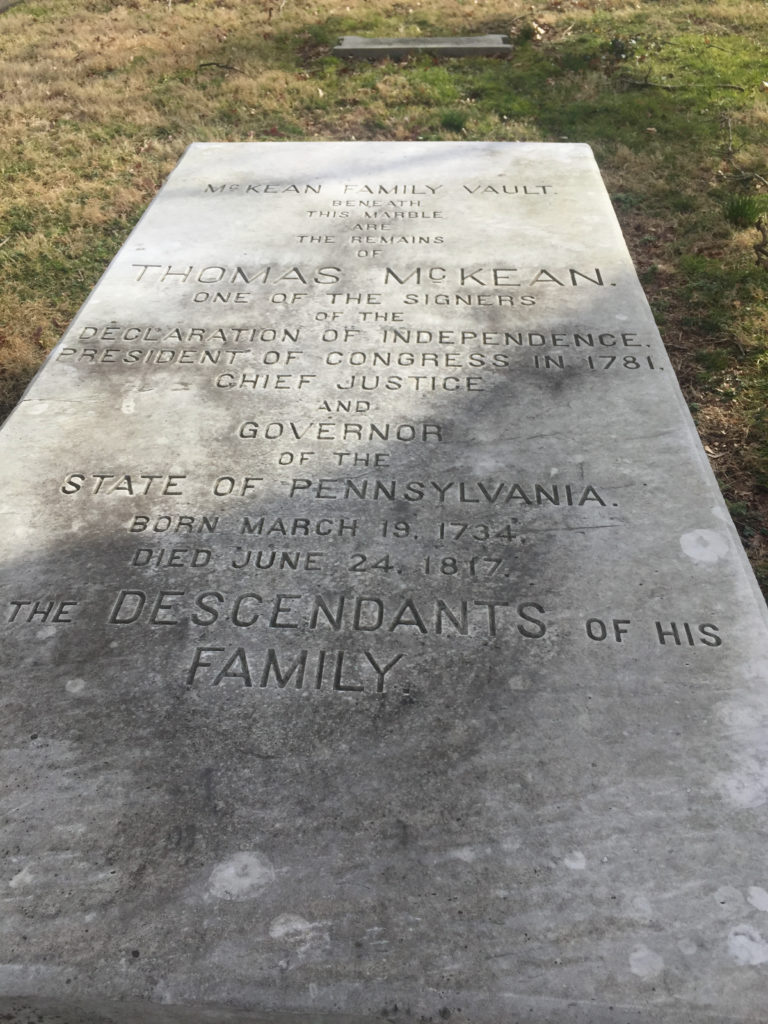Erik Visits an American Grave, Part 930
This is the grave of Thomas McKean.

Born near Philadelphia in 1734, McKean grew up in a respectable family of the mid 18th century. His parents were Irish Protestant immigrants and his father ran a tavern. McKean had a good largely private education and then went to read law in New Castle, Delaware in 1750 when he was only 16. He was admitted to the bar in 1755 in Delaware and 1756 in Pennsylvania. He rose pretty quickly in the political and legal life of both colonies. He became deputy attorney general for Sussex County, Delaware in 1756. He served in the Delaware general assembly in a number of roles. As the colonies moved toward revolution, McKean was there was Cesar Rodney as the most important figures in Delaware. They represented the colony at the Stamp Act Congress in 1765. Unfortunately, it was McKean’s idea that each colony have the same representation, which laid the groundwork for the disastrous Articles of Confederation and the tremendously undemocratic U.S. Senate that destroys any chance for progressive change in 2021.
By 1775, McKean was living mostly in Philadelphia. But he was still considered a political leader in Delaware. That colony sent him to the First Continental Congress and the Second Continental Congress. He was a very strong advocate for independence, one of the strongest in 1775 and early 1776 when not that many people wanted to go that far. As soon as he voted for the Declaration of Independence, he rode off to be a colonel in the Fourth Battalion of the Pennsylvania Associators, where they helped in Washington’s defense of New York. That meant he didn’t actually sign it until much later. But he was a major supporter of it and one of the most underrated figures in our historical memory about the early American Revolution. For his work, Delaware threw him out of the Continental Congress the next year as conservatives in that deeply divided colony took over. But he was back when the Congress created the Articles of Confederation, which he also was a big supporter. He was also president of the Congress for a bit, though that wasn’t a particularly powerful position.
While McKean was in Congress from Delaware, he was also the Chief Justice of Pennsylvania, starting in 1777. He stayed in that role for the next 22 years. He is a tremendously important individual in the history of American judiciary because he established the idea of judicial review of legislative acts, laying the groundwork at the state level for what John Marshall would later do at the federal level. He was a mixed bag in terms of progressive ends, not being very good at enforcing the the state freeing slaves but being pretty good on finding space for prisoners’ rights in an era when they didn’t really exist. But the real import here is the principle of judicial review much more than anything he actually did. He was not a delegate to the Constitutional Convention but did do a lot of work to get Pennsylvania to ratify the document.
In 1794, McKean resisted Alexander Hamilton’s deep desire to kill people in the Whiskey Rebellion, arguing that the judiciary could deal with it and the military force was not needed. This helped move McKean away from the Federalists and toward the Jeffersonians. As a Jeffersonian, he was elected governor of Pennsylvania (I actually have to state this because it could have happened in Delaware!) in 1799, ending his long tenure in the court. He served three terms as governor, at first purging Federalists from state government but then effectively going back to the Federalists in 1805 for his third term and then purging Jeffersonians! McKean tried to bust the Republican newspapers attacking him in his third term and he sued the editor William Duane for libel and won a limited victory. His political enemies tried to impeach him as well, but that failed.
After he left office in 1808, McKean led the campaign to build up defenses of Philadelphia in the War of 1812. He also got super rich, investing heavily in real estate. He became a senior political figure until he died in 1817, at the age of 83.
Interestingly, McKean’s grandson became prime minister of Spain for two months in 1847. His daughter married a prominent Spanish diplomat and there we go.
Thomas McKean is buried in Laurel Hill Cemetery, Philadelphia, Pennsylvania.
If you would like this series to visit other signers of the Declaration of Independence, you can donate to cover the required expenses here. Josiah Bartlett is in Kingston, New Hampshire and William Floyd is in Westernville, New York. Previous posts in this series are archived here.


